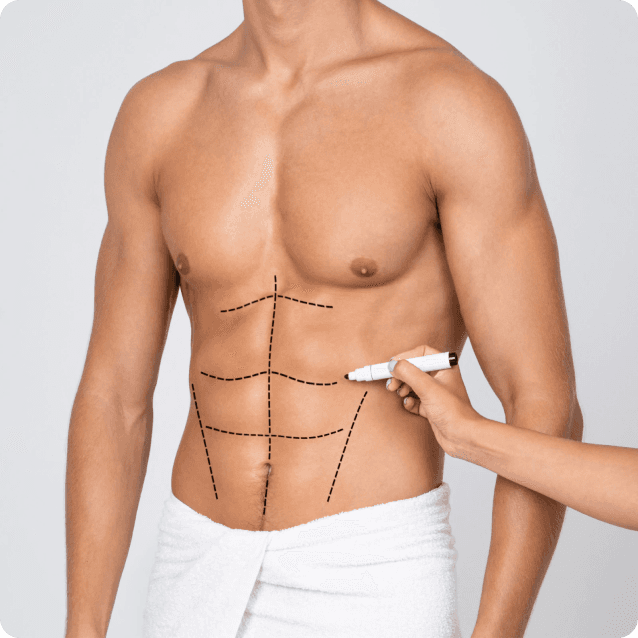Liposuction for Men
What is a Liposuction?
Liposuction is a cosmetic surgical procedure designed to remove excess fat from specific areas of the body. It involves the use of a thin, hollow tube called a cannula, which is inserted through small incisions to suction out fat deposits. The procedure aims to contour and reshape the body, improving overall proportions and achieving a more defined silhouette. Liposuction can be performed on various areas, including the abdomen, thighs, arms, and hips.
What to do before a Liposuction?
Dos:
Consult with a board-certified plastic surgeon: Choose a surgeon with experience in liposuction to ensure the procedure aligns with your goals and anatomical considerations.
Discuss your medical history and goals: Provide a comprehensive overview of your medical history, including any medications, previous surgeries, and specific concerns regarding your body shape.
Maintain a healthy lifestyle: Engage in regular exercise and follow a balanced diet to ensure your body is in optimal condition for the procedure and recovery.
Follow pre-surgery instructions: Adhere to any guidelines provided by your surgeon regarding medications, diet, and lifestyle changes leading up to the procedure.
Don'ts:
Avoid smoking and alcohol: Refrain from smoking and consuming alcohol at least two weeks before surgery to minimize complications and promote healing.
Don’t use medications that increase bleeding risk: Avoid taking blood-thinning medications or supplements, such as aspirin and certain herbal products, unless approved by your surgeon.
Avoid strenuous activities: Refrain from engaging in intense physical activities or sports that could affect the procedure or recovery before the surgery.
What to do after a Male Gluteoplasty?
Dos:
Follow post-operative care instructions: Adhere to the care plan provided by your surgeon, including taking prescribed medications and following dietary recommendations.
Wear compression garments: Use compression garments as recommended to reduce swelling and support the healing process.
Maintain a healthy lifestyle: Continue with a balanced diet and regular exercise to sustain the results of the procedure.
Attend follow-up appointments: Regular check-ins with your surgeon are essential to monitor healing progress and address any concerns.
Don'ts:
Avoid heavy lifting and strenuous activities: Refrain from lifting heavy objects or engaging in intense exercise for several weeks post-surgery to avoid complications.
Don’t touch or press on the chest area: Avoid placing pressure on the chest or manipulating the surgical area to support proper healing.
Avoid smoking and alcohol: Continue to avoid smoking and alcohol during the recovery period to support optimal healing.
Who is the best candidate for Liposuction?
The best candidates for liposuction are individuals who have stubborn fat deposits that do not respond to diet and exercise. The ideal candidates are:
In good overall health: Candidates should be generally healthy and free from conditions that could interfere with healing.
Have realistic expectations: Understanding the potential results and limitations of the procedure is important for satisfaction.
Have stable weight: Maintaining a stable weight is important as significant weight fluctuations can affect the results.
Non-smokers: Smoking can impair healing, so it's preferable for candidates to be non-smokers or willing to quit before and after surgery.




